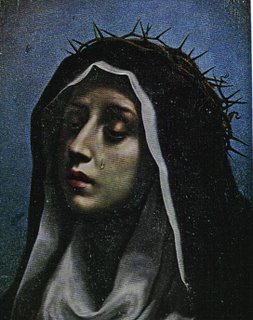
Therefore Saint Ildephonsus did not hesitate to assert, "to say that Mary's sorrows were greater than all the torments of the martyrs united, was to say too little." And Saint Anselm adds, that "the most cruel tortures inflicted on the holy martyrs were trifling, or as nothing in comparison with the martyrdom of Mary." Saint Basil of Seleucia also writes, "that as the sun exceeds all the other planets in splendour, so did Mary's sufferings exceed those of all the other martyrs." A learned author concludes with a beautiful sentiment. He says that so great was the sorrow of this tender Mother in the Passion of Jesus, that she alone compassionated in a degree by any means adequate to its merits the death of a God made man.
But here Saint Bonaventure, addressing this Blessed Virgin, says, "And why, 0 Lady, didst thou also go to sacrifice thyself on Calvary? Was not a crucified God sufficient to redeem us, that thou, His Mother, wouldst also go to be crucified with Him?" Indeed, the death of Jesus was more than enough to save the world, and an infinity of worlds; but this good Mother, for the love she bore us, wished also to help the cause of our salvation with the merits of her sufferings, which she offered for us on Calvary. Therefore, Blessed Albert the Great says, "that as we are under great obligations to Jesus for His Passion endured for our love, so also are we under great obligations to Mary, for the martyrdom which she voluntarily suffered for our salvation in the death of her Son." I say voluntarily, since, as Saint Agnes revealed to Saint Bridget, "our compassionate and benign Mother was satisfied rather to endure any torment than that our souls should not be redeemed, and be left in their former state of perdition." And, indeed, we may say that Mary's only relief in the midst of her great sorrow in the Passion of her Son, was to see the lost world redeemed by His death, and men who were His enemies reconciled with God. While grieving she rejoiced," says Simon of Cassia, that a sacrifice was offered for the redemption of all, by which He who was angry was appeased."
So great a love on the part of Mary deserves our gratitude, and that gratitude should be shown by at least meditating upon and pitying her in her sorrow. But she complained to Saint Bridget that very few did so, and that the greater part of the world lived in forgetfulness of them: "I look around at all who are on earth, to see if by chance there are any who pity me, and meditate upon my sorrows; and I find that there are very few. Therefore, my daughter, though I am forgotten by many, at least do thou not forget me; consider my anguish, and imitate, as far as thou canst, my grief." To understand how pleasing it is to the Blessed Virgin that we should remember her dolours, we need only know that, in the year 1239, she appeared to seven devout clients of hers (who were afterwards founders of the religious order of the Servants of Mary), with a black garment in her hand, and desired them, if they wished to please her, often to meditate on her sorrows: for this purpose, and to remind them of her sorrows) she expressed her desire that in future they should wear that mourning dress. Jesus Christ Himself revealed to the Blessed Veronica da Binasco, that He is, as it were, more pleased in seeing His Mother compassionated than Himself; for thus He addressed her: "My daughter, tears shed for My Passion are dear to Me; but as I love My Mother Mary with an immense love, the meditation of the torments which she endured at My death is even more agreeable to Me."
Wherefore the graces promised by Jesus to those who are devoted to the dolours of Mary are very great. Pelbert relates that it was revealed to Saint Elizabeth, that after the assumption of the Blessed Virgin into heaven, Saint John the Evangelist desired to see her again. The favour was granted him; his dear Mother appeared to him, and with her Jesus Christ also appeared; the Saint then heard Mary ask her Son to grant some special grace to all those who are devoted to her dolours. Jesus promised her four principal ones: First, that those who before death invoke the Divine Mother in the name of her sorrows should obtain true repentance of all their sins. Second, that He would protect all who have this devotion in their tribulations, and that He would protect them especially at the hour of death. Third, that He would impress upon their minds the remembrance of His Passion, and that they should have their reward for it in heaven. Fourth, that He would commit such devout clients to the hands of Mary, with the power to dispose of them in whatever manner she might please, and to obtain for them all the graces she might desire. In proof of this, let us see, in the following example, how greatly devotion to the dolours of Mary aids in obtaining eternal salvation.
EXAMPLE
In the revelations of Saint Bridget we read that there was a rich man, as noble by birth as he was vile and sinful in his habits. He had given himself, by an express compact, as a slave to the devil; and for sixty successive years had served him, leading such a life as may be imagined, and never approaching the sacraments. Now this prince was dying; and Jesus Christ, to show him mercy, commanded Saint Bridget to tell her confessor to go and visit him, and exhort him to confess his sins. The confessor went, and the sick man said that he did not require confession, as he had often approached the sacrament of penance. The priest went a second time; but this poor slave of hell persevered in his obstinate determination not to confess. Jesus again told the Saint to desire the confessor to return. He did so; and on this third occasion told the sick man the revelation made to the Saint, and that he had returned so many times because our Lord, who wished to show him mercy, had so ordered. On hearing this the dying man was touched, and began to weep: "But how," he exclaimed, "can I be saved; I, who for sixty years have served the devil as his slave, and have my soul burdened with innumerable sins?" "My son," answered the father, encouraging him, "doubt not; if you repent of them, on the part of God I promise you pardon." Then, gaining confidence, he said to the confessor, "Father, I looked upon myself as lost, and already despaired of salvation; but now I feel a sorrow for my sins, which gives me confidence; and since God has not yet abandoned me, I will make my confession." In fact he made his confession four times on that day, with the greatest marks of sorrow, and on the following morning received the holy communion. On the sixth day, contrite and resigned, he died. After his death, Jesus Christ again spoke to Saint Bridget, and told her that that sinner was saved; that he was then in purgatory, and that he owed his salvation to the intercession of the Blessed Virgin His Mother; for the deceased, although he had led so wicked a life, had nevertheless always preserved devotion to her dolours, and whenever he thought of them, pitied her.
Extract from the book 'The Glories of Mary'
by St. Alphonsus Liguori
Peace of Christ to ALL




















